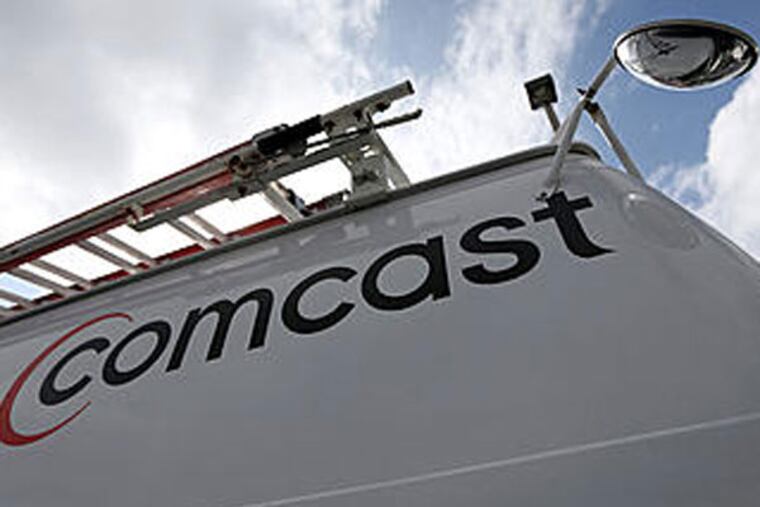Letters: No Comcast contract till it pays its fair share
THE BIGGEST questions for Philly candidates in 2015: How will we fund our schools? How will we ensure that, in the poorest big city in the coutry, poor communities have the resources they need to live lives of dignity?

THE BIGGEST questions for Philly candidates in 2015: How will we fund our schools? How will we ensure that, in the poorest big city in the coutry, poor communities have the resources they need to live lives of dignity?
The elephant in the room is Comcast. Our hometown giant is one of the world's richest companies, earning $2.59 billion in profit in the last reported quarter, up from $1.73 billion year over year.
Most of that money comes from us - Comcast subscribers - through local deals that Comcast negotiates, community to community. Comcast is about to negotiate a new franchise contract in Philly - the fourth-biggest media market in the country, as well as Comcast's hometown - that could let it sell almost-monopoly cable and Internet services in our city for another 15 years.
The time is now to get the resources from Comcast that our city deserves. In 2015, our city officials, and any person who wants to represent us in elected office, should say: No new deal from Comcast unless they pay their fair share to the city that has given them so much.
Communications services at home aren't a luxury - for school, work, and health, they are a necessity. While Philadelphia consumers pay hundreds of dollars or more a month to Comcast for needed communications services (with costs rising an average of 3.4 percent in 2015), Comcast pays next to nothing in property taxes on its current building. It also applied for a 10-year tax abatement on its new building, and won more than $42 million in promised subsidies from the city and commonwealth.
At the same time, our property-tax-funded schools operate on a shoestring. Maybe Germantown High, Bok Technical High School or others of the 24 schools that Philly closed would be open today if Comcast had paid its fair share. But Comcast and its executives donated big bucks to education-cutter Gov. Corbett's reelection campaign, and brokered deals that put far too many burdens on Philly's teachers.
With its new, subsidized building, Comcast says that it's "competing for talent all over the world." But how is Comcast making sure that our home-grown talented youth have a chance to succeed?
Comcast's answer to that has been grants from its foundation, and its Internet Essentials (IE) program. Offered to regulators as a sweetener in Comcast's last merger with NBC, IE offers $10/month Internet, a refurbished computer and training for qualified families. Here at Media Mobilizing Project, we've canvassed citywide, especially at Comcast customer centers, asking residents about IE. We've heard tons of complaints: not only is the speed too slow to do homework, but customers are treated as second-class - participants are forced to reapply and "prove poverty" almost every year, some participants endure background credit checks and the online application for the program simply doesn't work well. Beyond these problems, the program applies only to certain families, with low-income seniors, folks with disabilities and millions of others left out across the country.
Comcast's charity and efforts at digital inclusion are meaningful - but they are also an attempt to curry favor in D.C. as Comcast tries to merge with Time Warner Cable, and works to eliminate anti-discrimination rules online, or "net neutrality." Comcast vows to break the digital divide - but only if the government stops regulating its monopoly and lets it prioritize the content that pays it best.
Comcast execs claim that they can't - or won't - invest in our communities unless they get what they want. But Comcast wants something from Philadelphia right now - a renewal of its 15-year deal that lets them sell us cable. In exchange for almost monopoly access to our public rights-of-way, we currently get about 5 percent of its gross cable revenues every year and important resources for public access television.
But more than 5,000 people have signed a petition demanding that the city negotiate for way more this time around. We are saying: No new deal with Comcast unless we get affordable, fair rates for hundreds of thousands more Philadelphians; the resources our city needs to fund schools and services; and for Comcast to get out of the way of bringing new communications competition and innovation to our market, driving prices down and service access and quality way, way up.
The city has begun the franchise process by conducting a needs assessment of thousands of Philly Comcast consumers and other residents. They will release it soon, then announce public hearings, so we can tell Philly what we need from Comcast. MMP and our CAP Comcast campaign will work this year to get the word out about this process; and let the public in on a conversation that will define communications and corporate responsibility in Philly for a generation.
Comcast has the right to make money - but not by skirting taxes, speaking out against fully funded schools, equating charity with justice or by picking winners and losers on communications' local roads and our information superhighway. Luckily Philadelphians - and our elected officials - can do something about it this year. It's time for City Council and the mayor to use the renegotiation of Comcast's cable franchise to hold the company accountable to our right to communicate - and to make Comcast pay its fair share.